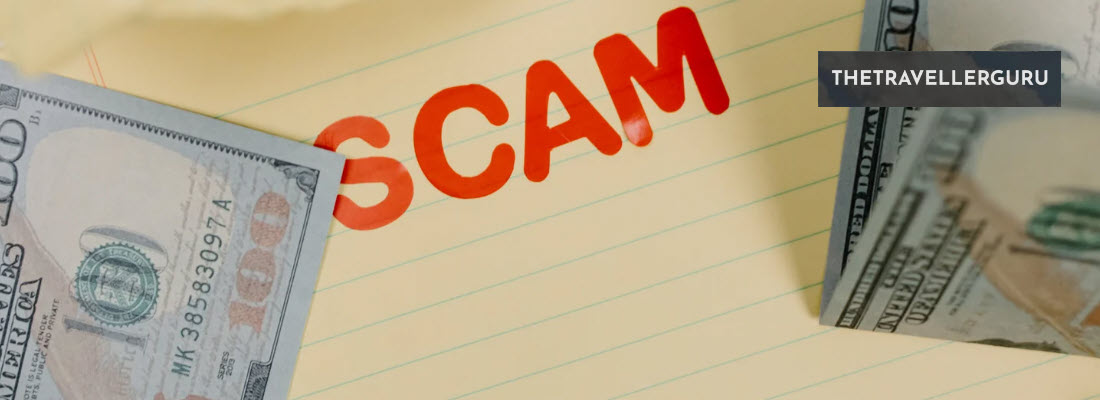Hey there my travel enthusiasts and welcome to my post where we will check out my 8 travel scams to avoid when out and about this year. When planning a trip, the last thing you want to worry about is being scammed.
Unfortunately, travel scams are a common occurrence in tourist destinations around the world. These scams can range from minor inconveniences to major financial losses, so it’s important to be aware of the most common travel scams and how to avoid them.
- Fake Authorities
- Fake Travel Operators
- Common Street Scams
- Credit Card Fraud
- Email Scams
- Taxi Scams
- Vacation Rental Scams
- Timeshare Sales Scams
Travel Scams to Avoid
When traveling, it’s important to be aware of common travel scams to avoid becoming a victim of fraud. Scammers come in many forms, from individuals to organized groups, and they often target unsuspecting tourists. By understanding the common scams and red flags, you can protect yourself and your finances. Here are some of the more common ones:
Check out these: Tips For Keeping Your Money Safe When Traveling
1. Fake Authorities
One common travel scam involves scam artists posing as official authorities, such as police officers or hotel staff, who claim that there is a problem with your reservation or that you need to pay a fine. They may ask for your passport or wallet, and then disappear with your valuables.
To avoid falling for this scam, always ask for identification and verify with the hotel or local authorities before giving out any personal information or money.
2. Fake Travel Operators
Another common scam involves fake tour operators or travel agents who promise low prices or exclusive access to popular attractions. They may ask for payment upfront and then disappear with your money, leaving you without a tour or ticket.
To avoid this scam, always research the tour operator or travel agent before booking, and never pay in full upfront.
Check out these: 6 Tips for Booking a Cheap Airfare Online
3. Common Street Scams
It’s also important to be aware of other common scams, such as pickpocketing, fake charity solicitations, and overcharging for goods and services. Always keep an eye on your belongings, be cautious of unsolicited offers, and negotiate prices beforehand.

4. Credit Card Fraud
Credit card fraud can happen anywhere, but it’s especially common in tourist areas. Be careful when using your credit card in unfamiliar places, and always keep an eye on your card when it’s out of your sight.
Skimmers can easily steal your card information, so it’s important to check your statements regularly for any unauthorized charges.
Check out these: Best RFID Travel Wallets
5. Email Scams
Email scams are a common way for scammers to steal your money or personal information so be wary of any emails you receive that ask for personal information or money. A common one here also is to offer to assist with your visa application as well.
Always double-check the sender’s email address and be cautious of any links or attachments in the email.
6. Taxi Scams
Taxi scams can happen in many different forms, from drivers taking longer routes to charging exorbitant fees. Always agree on a price before getting into a taxi, and make sure the meter is running. Be wary of drivers who offer to take you to “special” places or who claim that your hotel is closed.
Another common scam in many countries are unauthorized taxis. Always look for a fare meter, authorised taxi sticker on the cab or official identification from the driver.

7. Vacation Rental Scams
Vacation rental scams can be difficult to spot, but they can cost you a lot of money. This is where you view a site and then pay the money to someone directly into their bank account only to find that the property is already booked, or simply doesn’t exist.
Always research the property and the owner before booking a vacation rental and be wary of any listings that seem too good to be true, and never wire money to a stranger. At the end of the day, the safest way to avoid these scams is to use official booking sites such as Airbnb etc.
8. Timeshare Sales Scams
Timeshare sales are technically not scams but the sales agents here can be aggressive and convincing. They will often use hard tactics or the offer of free stuff to convince you to buy in.
Be wary of any high-pressure sales tactics and always read the fine print before signing any contracts. Remember that timeshares are often expensive and difficult to sell or get out of, so it’s important to make an informed decision.
High Risk Locations
When it comes to traveling, there are some locations that are more prone to scams than others. In this section, we’ll cover some high-risk locations that you should be aware of.
Europe
While Europe is generally a safe place to travel, there are some areas where you need to be particularly cautious. One common scam is the “found ring” scam, where someone will approach you and ask if you dropped a ring. They will then try to sell it to you at an inflated price.
Another scam is the “fake petition” scam, where someone will ask you to sign a petition and then demand money from you. To avoid these scams, be wary of anyone approaching you on the street and always keep an eye on your belongings.
Thailand
Thailand is a popular tourist destination, but it’s also a place where scams are common. One scam to watch out for is the “tuk-tuk scam,” where a driver will offer to take you on a tour of the city for a low price. They will then take you to various shops where they will receive a commission for bringing in customers.
Another scam is the “gem scam,” where you will be approached by someone who claims to be a government official and offers to sell you gems at a discount. To avoid these scams, always negotiate the price before getting into a tuk-tuk and be wary of anyone offering you a deal that seems too good to be true.
United States
While the United States may not be the first place that comes to mind when you think of travel scams, they do happen here. One scam to watch out for is the “fake hotel booking” scam, where you will receive a call from someone claiming to be from a hotel and offering you a discount on your booking. They will then ask for your credit card information and use it to make fraudulent charges.
Another scam is the “fake charity” scam, where someone will approach you on the street and ask for a donation to a fake charity. To avoid these scams, always double-check with the hotel before giving out your credit card information and be wary of anyone asking for donations on the street.

Preventive Measures
Protecting yourself from travel scams requires a combination of common sense, awareness, and caution. Here are some preventive measures that can help you avoid falling victim to travel scams:
- Personal Information – Be wary of providing your personal information to anyone you don’t know or trust. Scammers may use this information to steal your identity or access your financial accounts. Make sure to keep your personal information private and secure.
- Payment – Always use a secure payment method when booking travel arrangements. Avoid wire transfers or paying with cash, as these methods are often used by scammers to steal your money. Use a credit card or a reputable payment service to protect yourself from fraud.
- Travel Insurance – Consider purchasing travel insurance to protect yourself from unexpected events such as trip cancellations or medical emergencies. Make sure to read the policy carefully and understand what it covers and what it doesn’t.
- Verify – Before booking any travel arrangements, verify the legitimacy of the company or website you’re dealing with. Check for reviews, ratings and complaints online and make sure to read the fine print carefully. If something seems too good to be true, it probably is.
- Technology – Use technology to your advantage. Install anti-virus software on your devices and use secure Wi-Fi networks when accessing sensitive information. Be cautious of emails or messages from unknown sources and never click on suspicious links or attachments.
- Abroad – Be extra cautious when traveling abroad, as scammers may take advantage of tourists who are unfamiliar with their surroundings. Keep your belongings close and be aware of your surroundings at all times.
- Social Media – Be careful what you share on social media, as scammers may use this information to target you. Avoid posting your travel plans or personal information online, and be cautious of friend requests or messages from unknown sources.
What to Do If You Fall Victim
If you’ve fallen victim to a travel scam, it’s important to act quickly to minimize the damage. Here are some steps you can take:
- Contact your bank or credit card company. If you paid for the trip with a credit card, you may be able to dispute the charge and get your money back. If you wired money or paid with a debit card, your options may be more limited, but it’s still worth contacting your bank to see if they can help.
- Report the scam to the FTC and/or the Better Business Bureau. These organizations track scams and can help you report the incident. They may also be able to provide you with information about similar scams and how to avoid them in the future.
- Monitor your credit report and bank statements. Scammers may try to use your personal information such as your social security number to open new accounts or make fraudulent purchases. Keep an eye on your credit report and bank statements to make sure there are no unauthorized transactions.
- Be wary of follow-up scams. Scammers may try to target you again after you’ve fallen victim to a travel scam. Be on the lookout for suspicious emails, phone calls or letters that ask for personal information or money.
Remember, falling victim to a travel scam can be a frustrating and stressful experience, but it’s important to stay calm and take action as soon as possible. By following these steps, you can minimize the damage and protect yourself from further harm.
FAQs
What are some common travel scams and how can I avoid them?
There are many travel scams out there, but some of the most common include fake travel booking websites, “free” vacations that require you to pay hidden fees, and taxi drivers who overcharge you for a ride. To avoid these scams, make sure to do your research before booking anything, only book through reputable companies, and always negotiate the price of a taxi ride before getting in the car.
What should I do if I realize I’ve been scammed while traveling?
If you realize you’ve been scammed while traveling, the first thing you should do is try to get your money back. If that’s not possible, report the scam to the local authorities and your embassy or consulate. It’s also a good idea to warn other travelers about the scam so they don’t fall victim to it as well.
Conclusion
There you have it, my 8 travel scams to avoid when out and about this year. As usual, let me know of your experiences here or if there is anything you think I need to add.
Also, please do not hesitate to comment below if you have any questions, concerns, or corrections or would like me to check anything else out for you.
Until next time.
Have fun
Paul






